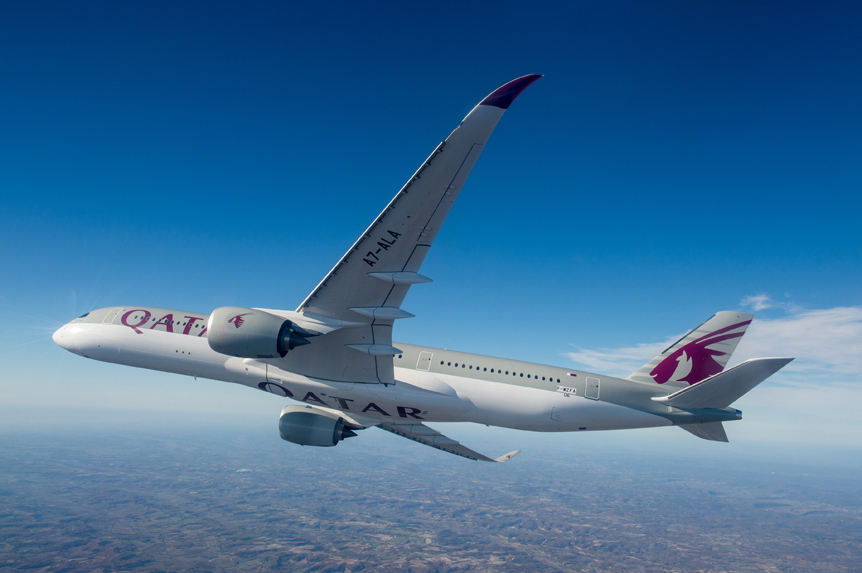
At long last… Yesterday, Qatar Airways eventually posted its financial results for 2017, with a loss of $69 million USD (QAR 252 million) for the full financial year – a 112% drop on the $573 million profit the airline reported for 2016. That might sound bad but all things considered, Qatar Airways appears to have weathered what it is calling “the most challenging year in its 20-year history” surprisngly well.
The reason last year was so challenging was because of the so-called “illegal blockade” imposed on the State of Qatar by a Saudi-led bloc of countries including the UAE, Bahrain and Egypt in June last year. Overnight, Qatar Airways was barred from flying to 18 destinations in these countries, while airspace restrictions imposed by the blockading countries meant Qatar had to fly longer routes.
The fact that the Doha-based airline recorded a loss is no surprise – in fact, many analysts were expecting the airline to have taken a far bigger hit given that the airline’s chief executive, Akbar Al Baker has been warning of a “very large loss” for months now. Comparing the results against competitors, losing $69 million is hardly cause for celebration but neither could it be considered the worst result ever.
Many airlines have been in far worse situations and have gone on to great success in the following years. Take British Airways as just one example – in 2010, the airline who’s parent company is part-owned by Qatar Airways, posted a loss of £531 million on the back of strike action and an economic downturn. Just seven years later and BA reported a profit of £1,774 million.
And then there’s the financial performance of neighbouring competitors to be considered – like Etihad Airways who lost $1.95 billion in 2016 and a further $1.52 billion in 2017 on the back of a failed equity investment strategy. All things considered, Qatar Airways didn’t do too badly at all.
“This turbulent year has inevitably had an impact on our financial results, which reflect the negative effect the illegal blockade has had on our airline,” explained Akbar Al Baker.
Speaking in more detail about the airline’s reaction to the blockade, Baker commented:
“Our initial stance was measured and considered. We acted quickly and calmly to prevent major disruption to our operations and passengers, and we took a strategic decision not to get involved in the politics surrounding this illegal activity.”
Which seems a little strange, as Baker has very much waded into the politics of the blockade, involving Qatar Airways on a number of occasions:
- Appearing at an European Commission hearing to talk about the blockade
- Frequent references to the “illegal blockade” in Qatar Airways press releases and the latest financial report
- Commissioning and playing ‘No Border, Only Horizons’ film on all Qatar Airways flights
Still, Qatar Airways was quick to react to the blockade by opening up a number of new routes – incredibly, the airline managed to start operations to Sohar, Prague and Kyiv within 10-weeks of the blockade as Qatar Airways looked at ways to redeploy its grounded fleet of Airbus A320 aircraft. The airline has also come to the rescue of British Airways, wet-leasing aircraft due to a staff strike and Boeing 787 engine problems.
Meanwhile, revenue from cargo operations grew by 34% – although, given the fact that Qatar can no longer accept goods from its only land border with Saudi Arabia, that new is by means a surprise.
But can the financials be trusted? Well, an independent auditing firm, EY did carry out an audit on behalf of Qatar Airways so that’s a good sign – although, they can only work with the figures provided by the airline. Remember, Qatar Airways isn’t publicly listed so they can release as much or as little financial data as they choose.
And let’s not forget that Qatar Airways is owned by a Qatari government investment fund – as such, it benefits from a number of tax breaks that more commericial airlines don’t enjoy. There’s even talk of Qatar Airways receiving a cash injection in the next 12-months.
The future
Qatar Airways was always going to post a loss this year – in fairness, it seems impossible to think any airline could weather a storm like the Saudi-led blockade without dipping into the red.
In a way, the relatively minor loss suits Qatar’s agenda – showing that it has been adversely affected by the blockade while also not appearing to be suffering too much and coping well in the face of adversity. The conclusion – don’t read too much into this financial report.
Mateusz Maszczynski honed his skills as an international flight attendant at the most prominent airline in the Middle East and has been flying ever since... most recently for a well known European airline. Matt is passionate about the aviation industry and has become an expert in passenger experience and human-centric stories. Always keeping an ear close to the ground, Matt's industry insights, analysis and news coverage is frequently relied upon by some of the biggest names in journalism.







